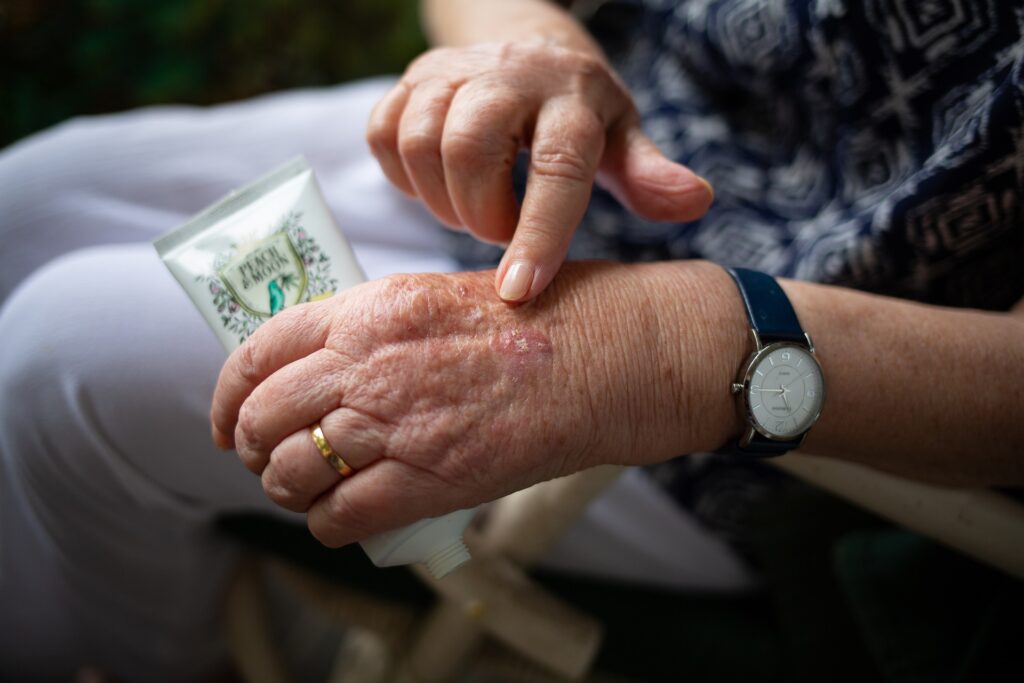Good skin care is important at any age, particularly for seniors. Aging skin is more sensitive and prone to certain issues later in life, and good skin care can help protect seniors from unwanted blemishes and new medical challenges.
Good skin care for seniors includes daily skin care, long-term skin care, and watching out for signs of skin trouble.
Daily Skin Care
Daily skin care for seniors is critical. It should be a mainstay of your daily routine. Daily skin care can be a simple chore with simple steps, but it is important to stay consistent. There are a few key components of a daily skincare routine for seniors.
Daily Cleansing
Seniors should cleanse their faces at least once daily with a gentle cleanser. Throughout the day, lots of natural oils can build up on the skin, which can cause issues over time. In addition, our skin is exposed to a lot over the day and can pick up microscopic debris that should be washed away.
Seniors do not have the same skin elasticity as they once had, so choosing a gentle cleanser that isn’t too harsh on the skin is important.
Sunscreen
Daily sunscreen is one of the most important but often overlooked parts of a daily senior skincare routine. Even small amounts of sun exposure from a daily walk or running errands can make a difference in the skin. Daily sunscreen application ensures that the skin is protected at all times.
Moisturizer
Another critical part of skin care for seniors is moisture. Seniors should use a daily moisturizer that prevents dryness without creating excess oil. A dermatologist or aesthetician can help you find a moisturizer that works well with your skin.
You should also keep in mind that you may have to change your moisturizer over time as your skin changes.
Long-Term Skin Care
In addition to daily senior skin care, long-term practices can help maintain healthy skin.
Exfoliants
Exfoliating is an important part of skin care for seniors. Exfoliating with a scrub or mask helps remove excess dead skin and reveals healthier layers of skin underneath.
Exfoliating does not need to be done every day for most seniors. Once or twice a week is a good rule of thumb. In addition, some exfoliants can be too harsh for aging skin, so seniors should opt for a gentle option.
Deep Cleansing
Daily cleansing is important for seniors, but daily cleansing can often leave some debris behind. Occasionally, seniors should spend time using a deep cleanser or a mask that does a more thorough job of cleaning the skin. Deep cleansers and masks pick up anything that daily cleansing may have missed and ensure that the pores stay clear.
Dermatologist Visit
Even the best skin care for seniors may not address all the skin issues that seniors are prone to. Seniors should try to visit a dermatologist once a year. A dermatologist can closely examine the skin and alert seniors to any underlying issues. They can also make recommendations on ways to improve your daily routine.
Signs of Skin Trouble
In addition to investing in daily and long-term skin care, you should be on the lookout for early warning signs of skin trouble. Spotting the signs early on can make a big difference in long-term treatment.
Moles
You should always be on the lookout for new moles on your skin. While most moles are benign, they can occasionally be a sign of skin cancer. As soon as you notice a new mole, you should seek a consultation with a dermatologist. A dermatologist can quickly determine whether a mole is a threat or not.
Infection
Skin infection is not uncommon among seniors. Even the best skin care for older adults may not be 100% effective in preventing disease. Seniors should watch out for common signs of skin infection:
- Sores
- Skin pain
- Red skin
- Puffy skin
- Red streaks
- Fever
Skin infections can usually be easily treated. However, they are unlikely to clear on their own and should be treated immediately.
Diabetics’ Skin Issues
Seniors with diabetes are more likely to experience skin issues at some point. Diabetic seniors often experience skin issues like bacterial infections, fungal infections, and itching. A good daily skincare routine can help keep these symptoms at bay.
How to Develop a Good Senior Skin Care Routine
The best way to develop an effective skincare routine is through trial and error with a professional’s help. Every senior’s skin is different, so different products may be more effective than others.
It can take trying a few different products to find one that works best. Seeking help from a professional like a dermatologist or aesthetician is another great way to find products and a routine that is most effective.

